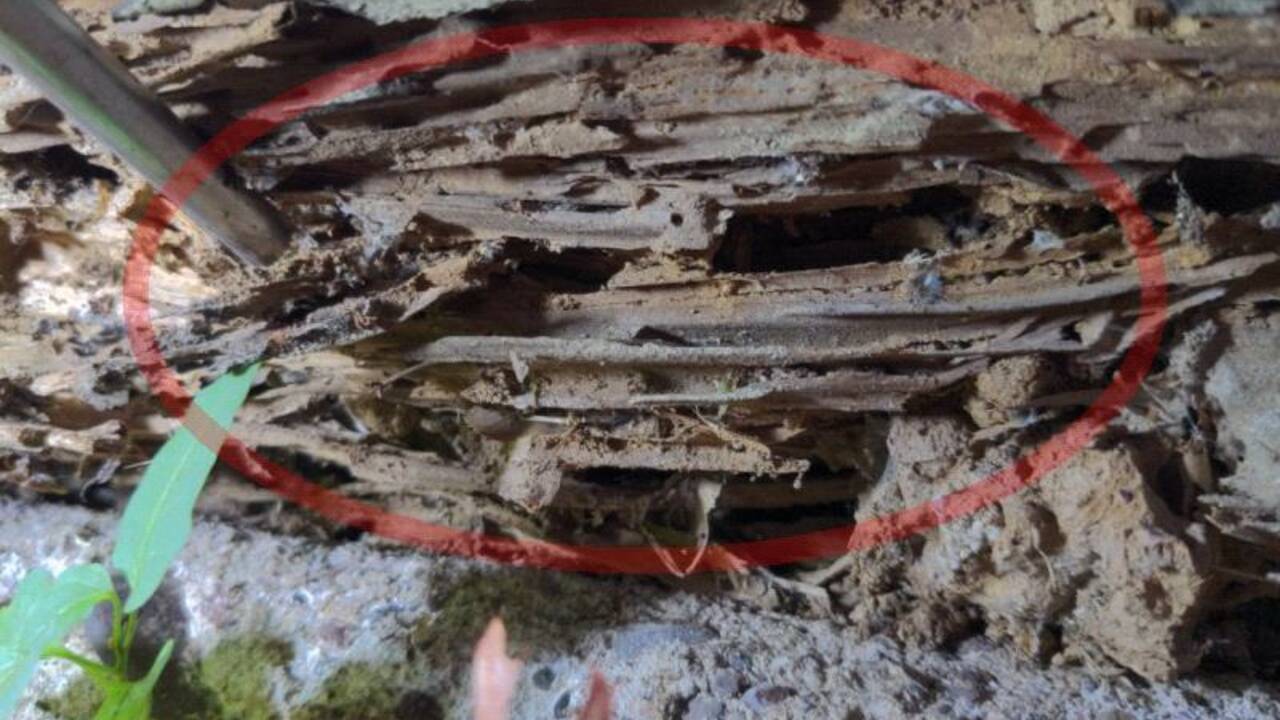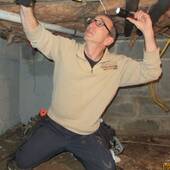A New Jersey home inspector who performs termite inspections should be knowledgeable about how to identify termites, termite damage and understand the life cycle of the subterranean termite most often found in New Jersey.
The termites found in NJ are called Eastern Subterranean termites. Termites live deep underground below the level of the frost line. Termites are active all year long. Often there is some confusion about the termites going dormant or dying in the winter months, but this is not the case. Termites are active all year because their habitant is deep in the soil where it stays warm.
Termites are rather fragile and require a lot of moisture to stay alive. Termites must often leave the wood they are feeding on to go back into the soil to replenish lost moisture. While eating wood termites leave moist soil inside the wood to maintain the moisture they need to survive. If the termites did not protect their bodies with this soil, they would quickly dry out and die. When termites have to cross over an unprotected area such as an interior foundation wall termites will combine dirt with saliva to construct mud tunnels. The mud tunnels help protect their fragile bodies from exposure to the air where the termites will dry out and die.
The NJ Subterranean termite can cause extensive damage. Termites have very hard jaws that bite off a very small piece of wood at a time. Hundreds of termites working all at once can cause damage very quickly. A small to medium sized termite colony has the ability to eat over 5 grams of wood each day. This equates to almost two and a half feet of 2x4 eaten in one year. Lager colonies can create much more damage. Over time a colony of termites can cause catastrophic damage to a home or building. The issue is that termites can be consuming the building structure for years before they are found.
A termite colony has several different types of termites. The reproductives are the termites that can reproduce. They create all the other termite types in the colony. The termite queen is the largest of all the termites and can measure over one-half inch long which is giant size compared to the other smaller termites in the colony. The queen is surrounded by the smaller king termites which help the queen reproduce.
There are thousands of worker termites in each colony. Workers provide food for the colony make repairs and tend to the colony. Workers are blind and work nonstop taking care of the termite colony. Workers are the termites that cause the damage to homes. Taking in the cellulose in the wood then after digesting it then regurgitating it for food for the termite colony.
A termite colony also has soldiers which are responsible for protection of the colony. The soldiers have armor on their heads and can crush threats with their strong jaws. They are capable of creating a thick sticky fluid that also traps invades to the colony.
When a termite colony becomes very large Swarmers are produced. Their purpose is the leave the colony and swarm usually in the spring months. Swarmers are called alates and have eyes and wings. These Swarmers are brown in color and are often confused with flying ants. Swarmers are poor flyers with males dying quickly and females shed their winds and burrow into the soil to form a new termite colony. Because termite Swarmers are poor flyers, they often end up close to the original colony. it is not uncommon for multiple satellite colonies to be established that attack the same building as the original colony. by the time a termite colony does swarm, significant structural damage to the home most likely was occurring.
Termite damage is often mistaken for water damage and wood rot. It is up to the NJ home inspector to be skilled enough in order to be able to differentiate the two problems. If there are hollowed out tunnels with remnants of dirt in them then there is definitive proof that the issue is being caused by termites. Termites eat wood along its grain leaving behind tunnels. You can tap or probe the wood to determine if it is hollow or soft. If the wood sounds hollow there is likely to be termite damage. Water damaged wood will not have dirt remnants or tunnels. If the area in question is wet the damage is most likely not going to be caused by termites. Termites like a moist environment but not a wet environment.
There are two types of wood rot. Both types are caused by fungus that cause damage to the cellulose in the wood. If the damaged area feels wet, then the issue is likely to be caused by wet rot and not termites. If the area breaks off in larger chunks and its is not wet the issue is likely to be caused by dry rot and not termites. If the wood appears to be hollow and there are channels in the wood with dirt remnants the damage is caused by termites.
Home inspectors in NJ should be able to inspect for termite damage in the homes they are inspecting. Home inspectors should be familare with the type of termites found in NJ and be able to properly educate their clients on the termite colony, life cycle, and how termites damage wooden structures. NJ home inspectors should also be able to identify the difference between termite damage, wood rot and water damage.
John Martino
LookSmart Home Inspections
NJ Home Inspectors Lic # 24GI00058700
Board Certified Master Home Inspector
American Society of Home Inspectors (ACI) #244472
International Association of Certified Home Inspectors (CPI) # 200090933
NJ Radon Lic# MET 11963
Commercial Pesticide Lic. (Termite Inspection License) # 27811B
Certified Mold Inspector
5 Preston Ave
East Hanover, NJ 07936
973 407-9621



Comments(4)